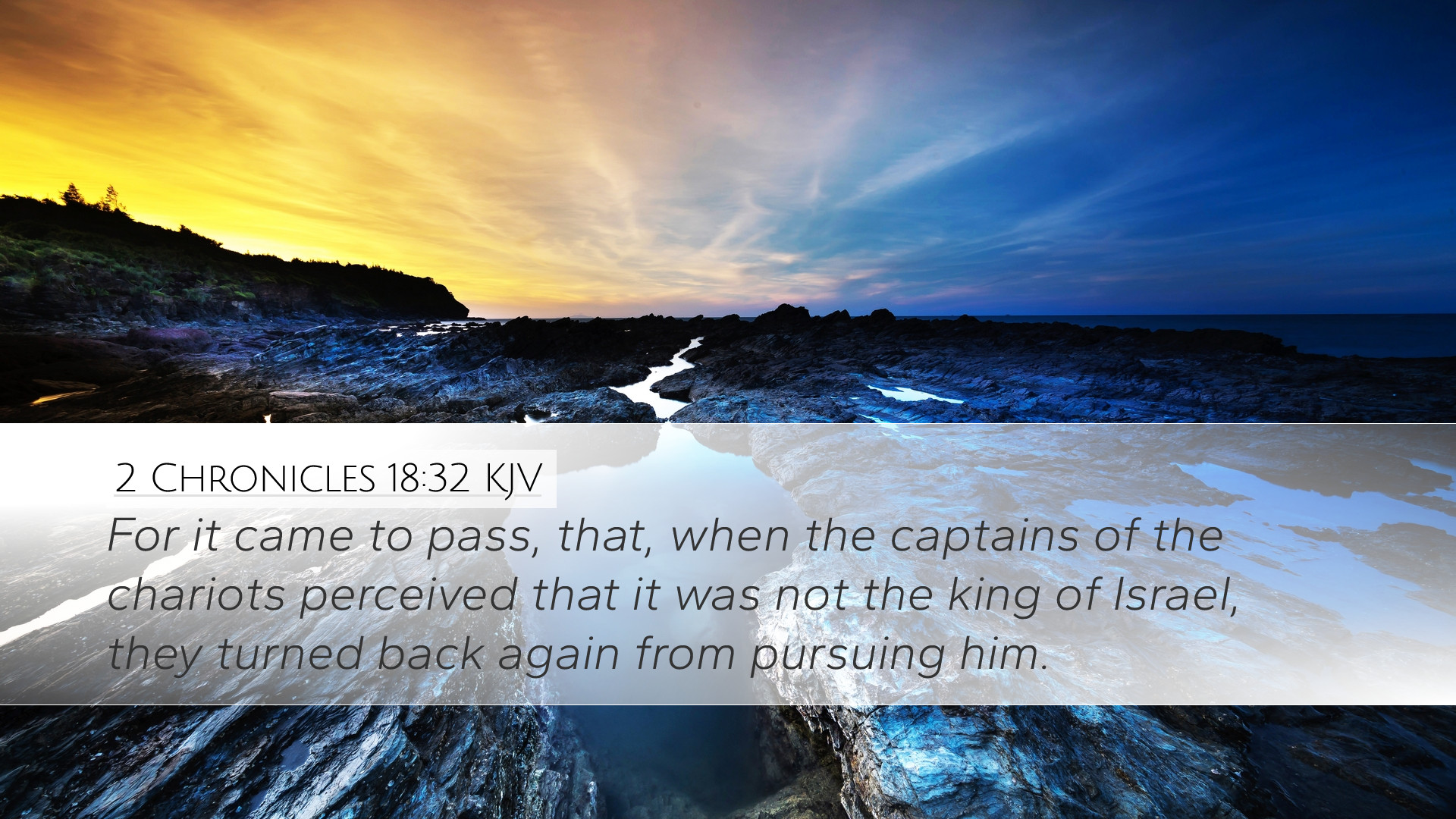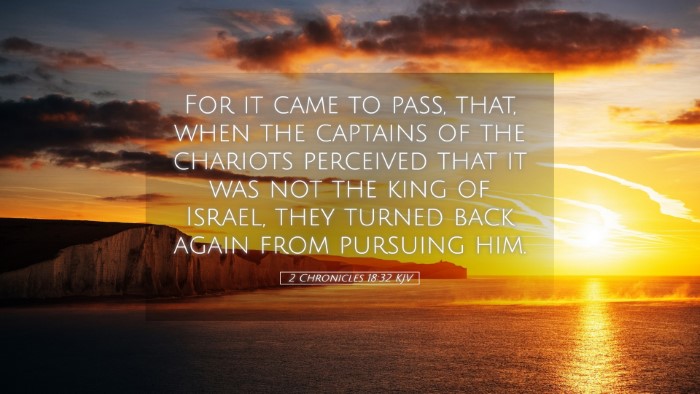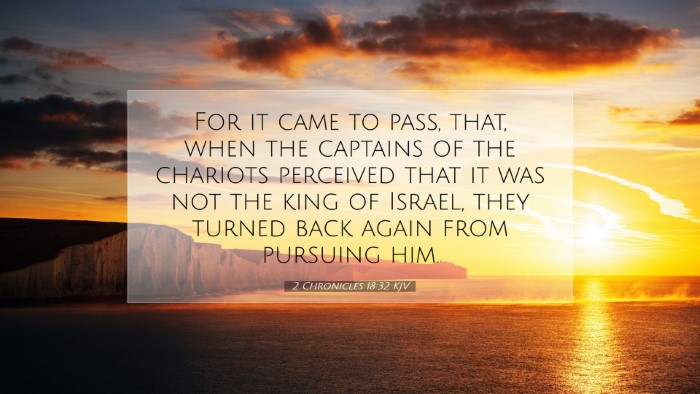Commentary on 2 Chronicles 18:32
2 Chronicles 18:32 reads: "And it came to pass, when the captains of the chariots saw Jehoshaphat, that they said, It is the king of Israel. Therefore they compassed about him to fight: but Jehoshaphat cried out, and the LORD helped him; and God moved them to depart from him."
Introduction
This verse presents a pivotal moment in the narrative of the alliance between the kingdoms of Judah and Israel, particularly in the reign of King Jehoshaphat. As we delve into this text, we will explore its theological implications, historical context, and practical applications, drawing insights from renowned public domain commentators such as Matthew Henry, Albert Barnes, and Adam Clarke.
Contextual Background
To fully understand 2 Chronicles 18:32, it is essential to consider its surrounding context within the chapter where Jehoshaphat allies with Ahab of Israel to confront the enemy, Ramoth-gilead. The narrative illustrates the tension between true prophetic counsel and the seductive allure of false prophets.
Historical Setting
This passage is situated during a time of conflict between Israel and Syria. Jehoshaphat is depicted as a king who seeks to please God yet falters in judgment when he forms an alliance with Ahab, who represents the idolatrous practices of Israel. This context sets the stage for understanding the dynamics of the battle and the divine intervention that follows.
Thematic Insights
- The Nature of Divine Providence: The verse exemplifies the interplay of human actions and divine providence. As the captains target Jehoshaphat, the king's cry for help serves as an example of faith under pressure.
- Identification and Misidentification: The identification of Jehoshaphat as the king of Israel underscores the danger of appearances. All too often, appearances deceive and lead to misjudgments about one's true identity and allegiance.
- The Role of Prayer and Deliverance: Jehoshaphat’s cry for help is a vital element in the theme of deliverance. It highlights the believer’s need for divine assistance amid life's chaotic battles.
Commentary by Matthew Henry
Matthew Henry emphasizes the providential care of God in moments of extremity. He notes that Jehoshaphat's cry was not merely a plea for physical safety but a recognition of his dependence on God's mercy. The commentators suggest that divine intervention is prompted by genuine repentance and faith.
Henry further points out that although Jehoshaphat found himself surrounded by enemies, God's timely help illustrates that the Lord preserves His people from destruction. He suggests that this narrative serves as an assurance for believers facing overwhelming odds.
Commentary by Albert Barnes
Albert Barnes highlights the military strategy of the captains as a significant point of interest. He notes that they mistakingly focused their efforts on apprehending Jehoshaphat, showing how miscalculations can occur in the heat of battle. Barnes elaborates that this moment serves as a reminder of the perils of alliances that lead believers away from God’s counsel.
Moreover, Barnes connects the text to broader themes of deliverance and the power of a single prayer in the face of peril. He underscores the promise found in the Lord’s assistance, indicating that even the simplest cries for help can summon divine aid.
Commentary by Adam Clarke
Adam Clarke offers a detailed analysis of Jehoshaphat's predicament. He expounds on the significance of Jehoshaphat’s outcry, comparing it to the cries of other biblical figures who sought divine mercy. Clarke asserts that the king's acknowledgment of his need for deliverance reflects a heart aligned with God.
Clarke also delves into the actions of God in causing the captains to abandon their pursuit, elaborating that it highlights the omnipotence of God who is able to turn the plans of men upside down. He encourages readers to place their trust in God's ability to redirect malevolent intentions.
Theological Reflection
From the combined insights of these commentators, several theological reflections emerge:
- God’s Sovereignty: God’s sovereignty over human affairs is apparent. The events surrounding Jehoshaphat illustrate that while kings make alliances, it is ultimately God who directs the outcomes.
- Faith in Crisis: Jehoshaphat’s response in prayer demonstrates the importance of maintaining faith in times of crisis, reminding believers to call upon God amidst their challenges.
- Community and Leadership: The actions of the captains speak volumes about the nature of leadership and the necessity for discernment in alliances and partnerships.
Practical Applications
The lesson from 2 Chronicles 18:32 extends beyond its immediate historical context. For modern pastors, theologians, and students of Scripture, several applications can be drawn:
- Seek Divine Guidance: In moments of strategic decisions, especially those involving partnerships, seek God's counsel through prayer and the Word.
- Embrace Vulnerability: Recognizing one’s vulnerabilities is not a sign of weakness. Like Jehoshaphat, reaching out for God’s help illustrates true strength of character.
- Awareness of Spiritual Warfare: Understanding that believers are in a continual battle against spiritual forces encourages a vigilant prayer life.
Conclusion
In conclusion, 2 Chronicles 18:32 serves as a profound reminder of the complexities of faith, the necessity of divine guidance, and God's unwavering presence amidst turmoil. By integrating insights from Matthew Henry, Albert Barnes, and Adam Clarke, we are encouraged to approach our battles with the confidence that God is our ultimate helper and deliverer.


